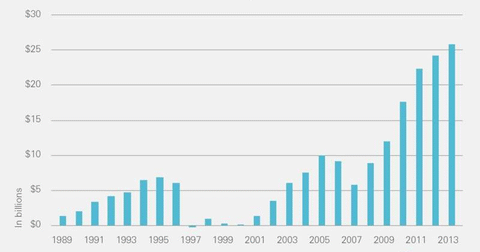Gap Between Teacher Salaries and Private-Sector Workers Increasing
Since 1999, public school teacher pay has risen from 10 percent to 23 percent higher than average worker
The Detroit Free Press recently reported that teacher salaries in Michigan have dropped 8 percent from 1999 to 2013 when factoring in inflation.
The average teachers’ salary in Michigan was $49,044 in 1999-2000 and increased to $61,560 in 2012-13.
But the gap in pay between teachers and the average worker has increased significantly over this time period. According to the U.S. Census Bureau, teachers now have 23 percent higher salaries than the median household income in Michigan, which was $50,115 in 2012. This is higher than in 1999-2000 when teacher salaries were 10 percent higher than the median household income of $44,667.
In 2013, the latest data available, the average private-sector worker’s annual pay in Michigan was $46,659 – about $15,000 a year less than the average teacher’s salary.
While some teachers may not be happy with the rate of which their salary is increasing, that discussion can’t be held in a vacuum, says one advocate for businesses in Michigan.
Charles Owens, state director of the National Federation of Independent Business, said the 14-year comparison of teacher salaries in Michigan done by the Free Press includes a time when the state was leading the nation in unemployment for 45 consecutive months from May 2006 to January 2010.
“You are going through the (former Gov. Jennifer) Granholm 'lost decade' when people were losing their jobs and leaving the state,” Owens said. “They can’t keep up with inflation when everyone else did worse. When you make these comparisons, you have to consider the private sector. They always want to compare in a vacuum. That’s not the real world.”
Teacher compensation is a complex discussion in Michigan, where school districts in the same county can have a difference of $23,000 in their average teachers’ salary. Also, salaries don’t include all compensation for teachers. In Troy Public Schools, a teacher with a $102,800 annual salary also has retirement costs of $22,000 a year and another $20,500 a year for health care costs.
In Michigan, public school teachers almost across the board are paid mostly based on years of service and level of education. Therefore, the teachers with the most experience make the most money. So if the percentage of older teachers drops, so would the overall average teachers’ salary even though it doesn’t necessarily mean individual teachers are making less.
There are fewer teachers 50 years and older than six years ago in Michigan. In 2007, 33.5 percent (37,358 teachers) of the teachers in Michigan were 50 years or older. In 2013, that number dropped to 27 percent (27,383 teachers). The loss of 10,000 of the highest paid teachers in the state (50 and older) would almost certainly reduce the average teachers’ salary over that six-year period.
But average salary doesn’t cover the wide range of salaries that are found in union contracts throughout the state.
In Berrien County, for example, the average teacher salary for New Buffalo Area Schools was $66,263 in 2012-13, the latest year salary data is available from the Michigan Department of Education. At Benton Harbor Area Schools, the average salary was $43,118. The cities are 32 miles apart from each other.
The starting salary at New Buffalo Area Schools is $36,961 and the top of the scale is $75,068, according to the union contract.
The starting salary at Benton Harbor Area Schools is $31,582 and the top of the scale is $59,375, according to the union contract.
The top salary for a teacher in Royal Oak is $85,964. In Livonia, the top of the scale for teachers is $82,984. In Eau Claire Public School, the most a teacher could make at the top of the pay scale was $55,772 in 2013.
And teachers can earn much more during the course of the year by taking on additional responsibilities. For example, the top paid Troy School District teacher made $120,321 in annual salary in 2013, even though the top-of-the-scale salary in the union contract is $97,746.
Michigan Capitol Confidential is the news source produced by the Mackinac Center for Public Policy. Michigan Capitol Confidential reports with a free-market news perspective.


 Carrollton teacher hopes that Michigan lawmaker ‘chokes on a bag of [expletive] and dies’
Carrollton teacher hopes that Michigan lawmaker ‘chokes on a bag of [expletive] and dies’
 Trump administration sues Michigan over climate litigation against oil and gas companies
Trump administration sues Michigan over climate litigation against oil and gas companies
 Caregivers protest union effort to skim home helpers’ pay
Caregivers protest union effort to skim home helpers’ pay
